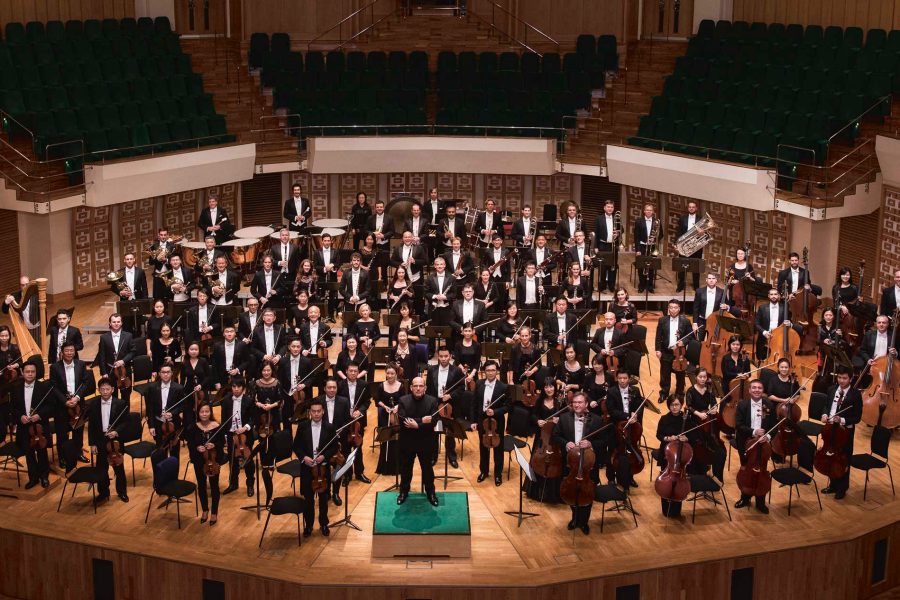The story of Hong Kong's classical music scene

Sydney has the Opera House. London has the Royal Albert Hall. New York has Carnegie Hall and Lincoln Center.
Hong Kong’s version – the Cultural Centre, the windowless brick building shaped like a skateboard ramp on the edge of Tsim Sha Tsui – isn’t quite as impressive. But it’s what’s on the inside that counts: the Hong Kong Philharmonic, the city’s main orchestra.
Its origins, like the appearance of the Cultural Centre, are much more humble.
‘During the Second World War the Japanese army melted down organ pipes for military use, and many musical enthusiasts found themselves in prison, where they conceived plans for a post-war symphony orchestra of Western and Chinese members,’ reads the entry filed under Hong Kong in the Grove Dictionary of Music and Musicians.

Credit: View Pictures / Getty Images
The orchestra did succeed in launching as an amateur group after the war, calling itself the Sino-British Orchestra, with a doctor at the conductor’s podium. But classical music was still struggling for airtime in Hong Kong, and the orchestra was limited by the lack of proper performance venues, according to Raff Wilson, who served the HK Phil for six years as its director of artistic planning before recently joining the Sydney Symphony Orchestra.
That changed when Hong Kong City Hall opened in 1962 to establish a community cultural centre. By 1974, the orchestra had changed its name to the Hong Kong Philharmonic Orchestra, and debuted as a professional group. The Hong Kong Chinese Orchestra followed a few years later, and the Cultural Centre arrived in 1989.
As Hong Kong grew into an international financial hub at the end of the 20th century, arts and culture blossomed in this increasingly affluent city. ‘It was no accident that a well-resourced and professional orchestra was a priority,’ says Wilson. Degree-granting music programmes launched at the universities, and a fully fledged conservatory launched in the mid-1980s at the Hong Kong Academy for Performing Arts.
My arrival in Hong Kong in 2012 coincided with that of powerhouse conductor Jaap van Zweden, who was starting his stint as the HK Phil’s music director. He’s been such a welcome addition that the HK Phil has renewed his position as orchestra leader until 2024, doubling up with his gig as music director of the New York Philharmonic, one of the most high-profile conducting posts in the world.

Credit: View Pictures / Getty Imges
The HK Phil isn’t the only act in town. The Hong Kong Sinfonietta was founded in 1990 to bolster the classical music scene for Hong Kongers – and is now notable for having a female conductor, Yip Wing-sie, at its helm. The City Chamber Orchestra of Hong Kong followed in 1999.
Hong Kong has continued to court both homegrown and international artists in recent years, from conductor Elim Chan to the Moscow Philharmonic. Other acts, including Pink Martini – from Portland, Oregon – have also performed in Hong Kong, thanks to annual events such as the Hong Kong Arts Festival and the International Chamber Music Festival.
A bubbling classical music revolution has also spread to the streets as the audience is driven to explore the unconventional. You can find chamber music performances popping up in art galleries like Artyze in Sheung Wan or bars like the one at Central’s Fringe Club, including shows by my own performing arts group, Western District. And plenty of Hong Kong composers such as Joyce Wai-chung Tang and Wendy Wan-ki Lee are churning out new music, from the neoclassical to the avant-garde. These are the seeds of the city’s next generation of music-making.
Hong Kong might not be Vienna. The Cultural Centre might not be the Royal Albert Hall. But like the city itself, Hong Kong’s classical music scene continues to evolve.
For more information on the Hong Kong Philharmonic, visit here
More inspiration
Hong Kong travel information
- China – the Chinese Mainland, Hong Kong SAR, Macao SAR and Taiwan Region
- Hong Kong SAR - English
- Chinese Mainland (China) - English
- Taiwan, China - English
- 香港特別行政區 - 繁體中文
- 中国內地 - 简体中文
- 中國台灣 - 繁體中文
- Africa
- South Africa - English
- Asia
- Bangladesh - English
- Korea - English
- Singapore - English
- Cambodia - English
- 한국 - 한국어
- Sri Lanka - English
- India - English
- Malaysia - English
- Thailand - English
- Indonesia - English
- Maldives - English
- ประเทศไทย - ภาษาไทย
- Indonesia - Bahasa Indonesia
- Myanmar - English
- Vietnam - English
- Japan - English
- Nepal - English
- Việt Nam - tiếng Việt
- 日本 - 日本語
- Philippines - English
- Australasia
- Australia - English
- New Zealand - English